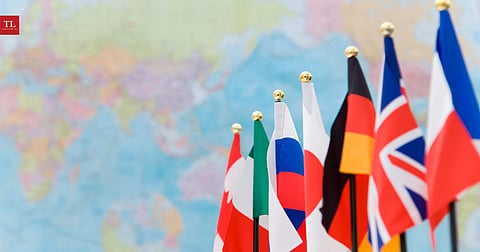

The G-7 countries have promised to donate one billion doses of the Covid vaccine to the so-called "developing" countries. The US has promised 500 million doses, Britain 100 million doses and the other countries like Italy, Japan, France, Germany, and Canada will make up the rest. The role of the developed countries in fighting the pandemic is insufficient, writes PRABHAT PATNAIK.
—-
"ONE billion doses" is extraordinarily paltry in relation to both the world's requirements and the enormous stockpiles present with countries. These countries have in excess for their population with two doses per person. It is for this reason that several international civil society organisations have dismissed the G-7 announcement as just a "public relations gimmick".
As of now, the total unvaccinated population in the world numbers 6.8 billion. A total of 13.6 billion doses are required to vaccinate this population with two shots. Thus, the one billion doses promised amounts to a bare 7.4 percent of this requirement. Even if the "developing countries" require only 10 billion doses, the promised quantity meets only 10 percent of the required doses.
The amount proposed to be donated comes to a small proportion of the quantity stockpiled by these countries. For example, the United Kingdom has a population of 68 million but has bought 500 million doses of the vaccine. The island nation would still have surplus stocks of 364 million doses after meeting its needs, of which it is proposing to donate only 100 million doses.
The purpose of retaining the remaining stocks is unclear. The vaccines will continue to be efficacious against the virus in the days to come and no new purchases are intended as the current output is enough to vaccinate the entire population. The same holds true for the United States and other advanced capitalist countries.
These promises made by G-7 are going to become available till the middle of the next year.
By the time these promised vaccines become available millions more would have died due to the pandemic. The amount donated by the G-7 is relatively small if compared to the needs of the world.
Prices of vaccines vary from company to company and it is still unclear which vaccines will be donated by the group. The EU is being charged $3 per dose for the Oxford-AstraZeneca vaccine while Pfizer's vaccine costs $19.5 per dose. If the US pays $20 per dose for the donated vaccine, the total cost will amount to roughly $10 billion, only 0.05 percent of its GDP.
At the same time, platitudes surrounding this offering hide the fact that the G-7 countries did not discuss the question of a temporary patent waiver on these vaccines, barring the US and France. If the G-7 had discussed and approved such a waiver, then that would have greatly increased the output of vaccines which would have been far more useful to the poor countries.
Even the host nation, the UK, has not agreed to a temporary patent waiver on the vaccines. This only underscores the strength of the commitment of these governments to promote and defend bourgeois interests. Their interests at present lie in perpetuating the global vaccine shortage that has created a congenial setting for profiteering.
Take Moderna as a case study. The company received $6 billion from the US government for research and development for the Covid vaccine. In return, it charges the government $15 per dose, which is more expensive than the $3-4 charged by AstraZeneca.
If the unit cost of production of a Moderna vaccine is $15, Moderna has no reason to charge more than $15 (or maybe a little bit more by way of profit margin). The reason is simple: the US government has spent money on research on its behalf. But the CEO of Moderna, Stephane Bancel, has said that anywhere between $25 and $37 (depending on the size of the order) constitutes a "fair price" for its vaccine.
The result of this profiteering resulted in Moderna's share price increasing six-fold between March 1 last year and April 30 this year. Its CEO has built up a fortune of $5.5 billion over the same period. Moderna is not the only one benefitting from the current vaccine shortage.
A simple statistic produced by Oxfam shows the magnitude of profiteering. According to Oxfam, the entire population of "low and middle-income countries" could be vaccinated for a total sum of $6.5 billion, if the patent waiver is granted to them. On the other hand, in the absence of a patent waiver, the cost would be $80 billion. The difference of almost $74 billion is the amount being paid in absence of a waiver.
Moreover, 90 percent of the cost of vaccinating the population of these countries would go into the pockets of those who hold the patents. But instead, bourgeois governments are interested in protecting such profiteering. These governments which have agreed to a temporary patent waiver want this profiteering to end after a few months. There is a need for a WTO agreement for a global waiver.
A patent waiver is additionally important for increasing the production of vaccines. But there is little evidence of any progress towards it. In a recent meeting of the WTO on June 9, countries finally backed "launching a process towards drafting an agreement", and "agreed on the urgency of this discussion".
But no effort was made by the seven most developed economies on these two positions to reach an agreement to end profiteering. As per reports, even the US and France did not make any special efforts to persuade their colleagues in the summit. (IPA Service)